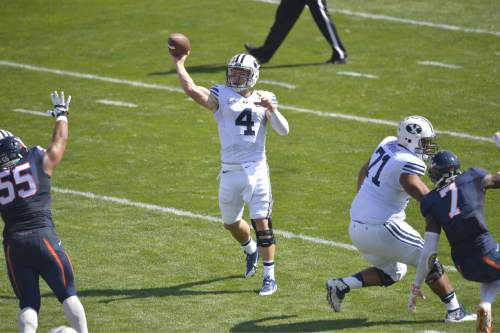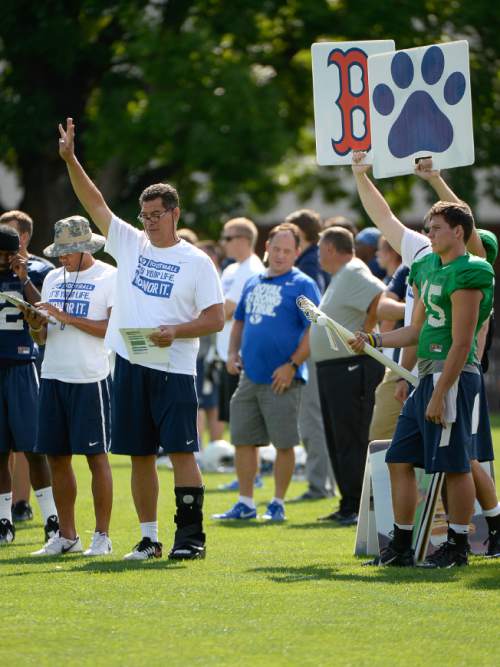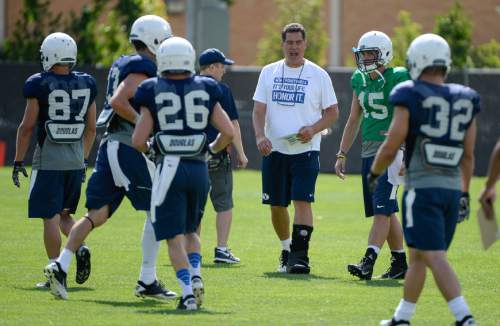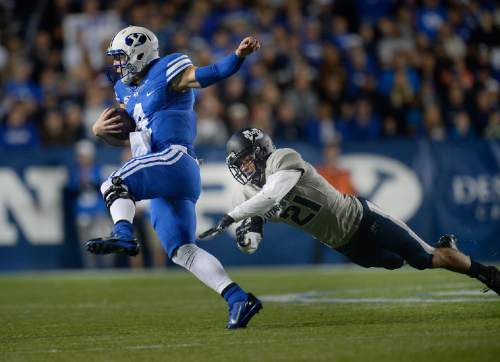This is an archived article that was published on sltrib.com in 2014, and information in the article may be outdated. It is provided only for personal research purposes and may not be reprinted.
Provo • Theories abound as to why BYU's football team is on a four-game losing streak, a stretch of futility that has included losses to three upper-level Mountain West foes and 5-2 Central Florida.
Suspect coaching, especially on the defensive side, has seemingly been fingered the most, followed by the injury excuse and plain ol' bad luck.
There might be another explanation that BYU coaches, players and some fans don't want to hear. Could it be that BYU simply does not have enough talented players to compete at the highest levels of college football?
If nothing else, injuries to starters and stars Taysom Hill, Jamaal Williams, Algie Brown, Bronson Kaufusi, Alani Fua and Craig Bills have shown that BYU sorely lacks depth. The dropoff has been precipitous.
Of the dozen or so coaches and players currently associated with the program who were asked if there is simply a talent shortage, only receivers coach Guy Holliday acknowledged that the Cougars could use an upgrade in skill, speed and athleticism, talents that generally define great football players. Holliday has been in the business for 22 years and coached in the SEC (Mississippi State) from 2003-06.
He did caution that there's more to playing football than being bigger, faster and stronger.
"To be fair, we have been a little deeper in other places I've been, a little more athletic," Holliday said. "We are in the process of trying to upgrade that. … But a lot of people get caught up in saying potential, potential. Potential will get you fired in this business. That's my philosophy."
Want proof that BYU's talent level is dropping? The number of players that BYU has had drafted by the National Football League has steadily slipped.
Nine players have been drafted in head coach Bronco Mendenhall's tenure (2006 draft to present). In the nine NFL drafts prior to that (1997-2005), 23 BYU players were selected, and two others (Ben Cahoon and Harland Ah You) were drafted by CFL teams.
In the nine-year span from 1988-1996, 13 BYU players were drafted in the first seven rounds, and seven others were drafted in later rounds. The draft was shortened to seven rounds in 1994.
The result is that former BYU players dot NFL rosters far more infrequently than they used to.
After the 55-30 loss to Boise State last Friday in which BYU looked slower, less physical and less prepared than the Broncos in every phase of the game, Mendenhall was asked if he has the right players to win games against the better teams on the schedule.
"I think we do," he said before talking about the need to coach them better.
There has also been a noticeable drop in recruiting.
Mendenhall regularly downplays the "star system" that national high school recruiting services such as Scout.com and Rivals.com have developed and says they are not always reliable. Make of them what you will, they do show a decline.
BYU's recruiting classes have been ranked no better than 60th by either service since 2010, when the Cougars were ranked 22nd by Scout.com and 40th by Rivals.com after getting Scout's five-star quarterback Jake Heaps, four-star receiver Ross Apo. four-star defensive tackle Graham Rowley, four-star defensive end Bronson Kaufusi and four-star linebacker Zac Stout. Heaps and Apo were busts; Rowley and Stout have been average players, at best, and Kaufusi has struggled mightily with injuries and a position change.
A drop in talent level or not, it is indisputable that BYU is not winning as often as it did before announcing in 2010 that it was going independent in football in 2011 and beyond. From 2006-09, BYU's average finish in Jeff Sagarin's computer rankings was 19. From 2010 through 2013, their average was 35. They are currently 50th, and dropping fast.
Offensive coordinator Robert Anae coached at Texas Tech from 2000-04, at BYU from 2005-10 and at Arizona from 2011-12 before returning to BYU in 2013. He said the talent level at BYU is "pretty comparable" to what he found at Arizona.
"There are pluses and minuses in every program, but I think we have recruited well," Anae said. "I think we could be very competitive in any of the major conferences."
These days, BYU fans would probably settle for being competitive in the Mountain West.
When Anae returned in 2013, he installed an uptempo offense he described as "Go Hard, Go Fast" and said he thought it would flourish at BYU because the school routinely attracted players who were diligent in their training habits and would achieve the stamina necessary to run plays quickly and efficiently.
Was that talk of commitment, dedication and desire a mask, of sorts, to cover a talent deficiency?
"No. Not at all," Anae said. "I just believe that you play to your strengths. As a coach, nobody is so single-geared and one-minded that they can't adjust to their personnel. Coaches do that all the time. Our guys are that type of people. So talent, you can look at a bunch of different ways. I like to look at talent as being able to do things that are very physical and demanding and fast-paced, and being able to execute at a high level doing that.
"We are on track," Anae continued. "Just when the thing was headed in the right direction with one quarterback, Taysom got injured, So now we shift gears and we start going down the path with [Christian Stewart]."
Stewart, by the way, walked on at BYU twice, sandwiched around a stint at Snow College, and most likely wouldn't be playing now if scholarship quarterbacks Ammon Olsen (Southern Utah) or Billy Green (Weber State) had not transferred.
The Cougars hoped their talent level would be bolstered by a slew of transfers from power-five schools, but so far Stanford's Keanu Nelson, Nebraska's Harvey Jackson, Oregon's Devon Blackmon and Utah's Harvey Langi haven't made much of an impact. Nelson did catch a touchdown pass against Nevada and Langi, a converted running back, got his first start at linebacker against the Wolf Pack.
Reserve safety Chris Badger (Notre Dame) and kickoff specialist Andrew Mikkelsen (Oregon State) also started their careers in power-five programs.
Langi disputed the notion that BYU's talent level is not comparable to Utah's, where he played in 2011, before a church mission.
"We are all D-I players," Langi said. "We all have talent. We all love this sport. We have all been blessed to play this sport. The U. guys, they all have great talent, and they are all hard workers. I could say the same for my team. They are here, and being a Cougar just establishes that you have that dedication, that determination, that will and that talent to be here."
Twitter: @drewjay —
BYU players selected in NFL Draft since 2006
2014 • Kyle Van Noy, LB
2013 • Ezekiel "Ziggy" Ansah, DE
2010 • Harvey Unga*, RB
2010 • Dennis Pitta, TE
2009 • Austin Collie, WR
2009 • Fui Vakapuna, RB
2008 • Bryan Kehl, LB
2007 • John Beck, QB
2006 • Todd Watkins, WR
*Unga was selected in the seventh round of the 2010 supplemental draft —
Recent recruiting
National recruiting services rankings for BYU's last seven classes:
Signing Class Scout.com Rivals.com
2008 58 83
2009 40 50
2010 22 40
2011 66 63
2012 60 62
2013 63 71
2014 62 71









